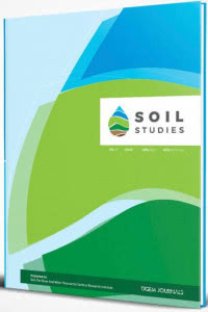Kil Bünyeli Bir Arazide Toprak Strüktürü ve Nem Sabitlerinin Tütün Atığı Uygulamasıyla Değişimi
Tütün atığı, kil bünyeli toprak, tarla kapasitesi, solma noktası, nispi doygunluk
Soil Structure and Moisture Constants Changed by Tobacco Waste Application in a Clay Textured Field
Tobacco waste clay soil, structure, field capacity, wilting point, relative saturation,
___
- Anikwe MAN (2000). Amelioration of a Heavy Clay Loam Soil with Rice Husk Dust and its Effect on Soil Physical Properties and Maize Yield. Bioresource Technology 74, 169-173.
- Busscher WJ, Bauer PJ (2003). Soil strength, cotton root growth and lint yield in a southeastern USA coastal loamy sand. Soil and Tillage Research 74, 151–159.
- Candemir F, Gülser C (2011). Effects of different agricultural wastes on some soil quality indexes at clay and loamy sand fields. Communications in Soil Science and Plant Analysis 42(1): 13-28.
- Demir Z, Gülser C (2015). Effects of rice husk compost application on soil quality parameters in greenhouse conditions. Eurasian Journal of Soil Science 4(3):185-190.
- Demir Z, Gülser C (2021). Effects of Rice Husk Compost on Some Soil Properties, Water Use Efficiency and Tomato (Solanum lycopersicum L.) Yield under Greenhouse and Field Conditions. Communications in Soil Science and Plant Analysis, pp.1-18.
- Demiralay I (1993). Soil physical analysis. Ataturk Univ. Agric. Fac. Pub. No:143, Erzurum.
- Dexter AR (2004). Soil physical quality Part I. Theory, effects of soil texture, density, and organic matter, and effects on root growth. Geoderma 120(3-4): 201-214.
- Gülser C (2004). A Comparision of some physical and chemical soil quality ındicators ınfluenced by different crop species. Pakistan Journal of Biological Sciences 7(6): 905-911.
- Gülser C (2006). Effect of forage cropping treatments on soil structure and relationships with fractal dimensions. Geoderma 131(1-2): 33-44.
- Gülser C, Candemir F (2015). Effects of agricultural wastes on the hydraulic properties of a loamy sand cropland in Turkey. Soil Science and Plant Nutrition, 61(3), 384-391.
- Gülser C, Candemir F, Kanel Y, Demirkaya S (2015). Effect of manure on organic carbon content and fractal dimensions of aggregates. Eurasian Journal of Soil Science, 4(1), 1.
- Gülser C, Ekberli I, Candemir F, Demir Z (2016). Spatial variability of soil physical properties in a cultivated field. Eurasian Journal of Soil Science 5(3): 192-200.
- Gülser C, Minkina T, Sushkova S, Kızılkaya R (2017). Changes of soil hydraulic properties during the decomposition of organic waste in a coarse textured soil. Journal of Geochemical Exploration, 174, 66-69.
- Gülser F, Salem S, Gülser C (2020). Changes in some soil properties of wheat fields under conventional and reduced tillage systems in Northern Iraq . Eurasian Journal of Soil Science , 9 (4) , 314-320 .
- Gupta SC, Dowdy RH, Larson WE (1977). Hydraulic and Thermal Properties of a Sandy Soil as Influenced by Incorporation of Sewage Sludge. Soil Science Society America Journal 41, 601-605.
- Iqbal J, Thomasson JA, Jenkins JN, Owens PR, Whisler FD (2005). Spatial variability analysis of soil physical properties of alluvial soils. Soil Science Society of America Journal, 69: 1338– 1350.
- Kacar B (1994). Chemical analysis of plant and soil analysis. Ankara Univ. Faculty of Agriculture Publication No. 3 Ankara.
- Mamedov A, Ekberli I, Gülser C, Gümüş I, Çetin U, Guy Levy GJ (2016). Relationship between soil water retention model parameters and structure stability. Eurasian Journal of Soil Science, 5(4): 314 - 321.
- Marinari S, Masciandar G, Ceccanti B, Grego S (2000). Influence of Organic and Mineral Fertilizers on Soil Biological and Physical Properties. Bioresource Technology 72, 9-17.
- Miller RW, Donahue RL (1995). Soils in Our Environment, Seventh Edition. Prudence Hall, Englewood, Cliffs, NJ. p. 323.
- Selvi KC, Gülser C, Beyhan MA (2019). Short Term Effects of Different Tillage Methods on Nitrate Content in Soil and Corn Yield." Malaysian Journal of Soil Science 23, 55-68.
- Soil Survey Staff (1993). Soil Survey Manuel. United States Department of Agriculture (USDA) Handbook No:18, Government Printing Office, Washington, D.C. USA.
- Usowics B, Lipiec J (2009). Spatial distribution of soil penetration resistance as affected by soil compaction: The fractal approach. Ecological Complexity 6, 263-271.
- Weil RR, Magdoff F (2004) Significance of soil organic matter to soil quality and health. In: Weil RR, Magdoff F (eds) Soil organic matter in sustainable agriculture. CRC press, Florida, pp 1–43
- ISSN: 2146-7072
- Yayın Aralığı: 2
- Yayıncı: Toprak Gübre ve Su Kaynakları Merkez Araştırma Enstitüsü
Sema KALE ÇELİK, Büşra DEMİRBAŞ
Organik Atık ve Sentetik Düzenleyici Uygulamalarının Kıvam Limitleri Üzerine Etkisi
Zerrin CİVELEK, Nutullah ÖZDEMİR
Üç Besinli ve Mikrobesinli Gübrelerin Damla Sulama Sistemine Uygunluğu Üzerinde Çalışmalar
Kil Bünyeli Bir Arazide Toprak Strüktürü ve Nem Sabitlerinin Tütün Atığı Uygulamasıyla Değişimi
